[The following is the transcription of Kinhide Mushakouji's Dialogue questions. It remains unedited at present, but will be updated shortly]
Veri Farina:
I am also from Venezuela. (omission) I agree with what my friend said. I'd
like to make it clear about Cassandra, for example. We don't have these
kinds of groups - it's a kind of fantasy. It's Spanish history, it's not
even Latin American [history].
Professor Mushakouji: I see. It's good to know that. Still - I like the story.
Veri Farina:
Professor Mushakouji:
Rossitza Ivanova:
Hi. I am studying about the Burakumin problem. First I just wanted to you
say that you put a stress on racial/gender discrimination, and I think
Buraku discrimination doesn't involve any of these categories. And I don't
think it can be compared to gypsy discrimination. Anyhow, I think there has
been some progress in promoting awareness in Japan, and I think
(omission)movement has done a lot about it. There's also the (omission)
organisation that has done a lot about it, or the Dowa [?] that has been
working on it. And I just wanted to ask you, do you think it's really doing
an effective job?
Professor Mushakouji:
Then about the Buraku Liberation Movement. I will not go into the details,
but there are three Buraku Liberation Movements, and it's very bad that
they disagree and they fight against each other. But that's part of my
question. I think that all people should fight together, but unfortunately
it's easier to be divided when you are discriminated against - you feel
that you are the one who knows how to liberate yourself. And that's part of
the whole problem - those who are discriminating are united from the
beginning, because they share some interest. But those for who are
discriminated against, there is also a divisive force, which is also used
by the powers to divide and rule. So that's the problem. But then if we
come back to what you mention (omission)which is the levelest movement
created in 1922 in Japan, that message can be shared not only by the Buraku
people (omission) but it can be shared by everybody. The declaration says
that now the we want to have a world with light and heat. And it is only
those who are in the cold that really know how cold the present world is.
They are the only ones who can really bring warmth - they have to be at the
centre of the effort to bring warmth, because you know cold, because you
know darkness, and if you really know that it's very dark, then you can
bring light. So that is the basic message which I think is true. So this is
where we have to come to. The problem is the people who are just slumbering
in the warmth and the light who don't bother about bringing real warmth and
light to the whole society. So this is where the problem is - how the
intellectuals, and especially the young intellectuals, can have a common
front with the people discriminated against, not only the Ainu people and
the Buraku people, but many different social categories all around the
world; in the rich countries but also especially in the less industrialised
countries. So that's what I think I would like to say. It's not a complete
answer, but that's my feeling.
Motoshi Suzuki:
In the place where I was born - that's Hamamatsu, Shizuoka Prefecture, we
didn't have a specific class to reduce the discrimination toward the Buraku
people. Actually we have Buraku areas in Hamamatsu but we didn't know where
they were. And here in Kyoto, or other Kansai areas, there are many schools
with specific classes about the Buraku people. Then my friend told me that
they got to know about the existence of the Buraku areas and people in a
class. Sometimes education accelerates or promotes the discrimination
against Buraku people. D you think it's better to let it go without
notifying any discrimination for students, or education should deal with
discrimination? How do think we should deal with discrimination with student?
Professor Mushakouji:
Andreas Knobel:
Ramona Fieru:
My major is political science, so my question is do you think that Japanese
men should apologise for sexually aggressive behaviour during the Second
World War?
Professor Mushakouji:
My answer is unambiguous. That's the only question I can answer in a very
clear way. Yes, very strongly, this is my firm belief. I myself, belonging
to the masculine part of Japanese society, have to make a deep and genuine
apology. Not just an apology, but to make it that this is not repeated. But
it is now repeated - the problem during the war was state-run. For example
- the case of the so-called "comfort women" was run by the state. But now
we have a second kind of slavery, not run by the state, but tolerated and
supported by us - Japanese men. So it's not just enough to apologise, but
to change. And this is why I am deeply involved in this campaign to
eliminate trafficking women and children. So definitely my answer is yes.
But I must add to that, that many Japanese men want to apologise, but they
are not aware of the fact that the state of Japan has to also apologise. So
it's not enough for us to apologise - we need the state of the state of
Japan to apologise, because it was the state who enslaved the women, and
also tolerated, at least, the rapes. So besides men apologising, the state
should make an apology. Now the state is saying, "you men should
apologise." The state will not do anything because it's "your fault." And
that's also wrong.
Leo Gomez:
How can we be sure that media and technology don't contribute to
discrimination? Many of our misconceptions are founded on archetypes
constructed by the media. We usually say "oh, I saw on CNN. So I'd better
not go to Columbia, because it's dangerous (omission)." So how can we trust
in a dialogue, what we hear on media or technology?
Professor Mushakouji:
Alison Rodham:
My question is regarding your preparations for the Beijing plus five. It
came to my attention recently at an NGO conference that in Beijing itself,
back in 1995, the declarations that were made excluded gay and bi-sexual
women. My main question is why do you think they were left out, because
that is yielding to religious groups and it shows that Beijing itself,
which is supposed to be a model, actually discriminates and is intolerant
against groups, which is hipocrisy. And has anything been done in
preparation for Beijing plus five to eliminate this hipocrisy. Thank you.
Professor Mushakouji:
This is a very important point and I completely agree with you that Beijing
was not ideal. But if I may just add another point. After Beijing there
was, in this part of the world, a financial crisis, and even the normal
questions which were raised in Beijing have to take into account the
development of this crazy economic situation. So there is a problem in
having a Beijing plus five, without realising that after Beijing so many
things happened and that made the situation worse. So that's one point. The
other is that the problem of us all, and this is where feminists are also
part of it, is that we have a certain kind of moral conception of how the
world should work. And this moral conception is completely discriminatory.
Many active feminists, but much more, the non-feminist part of the NGO
movement, are not really concerned about equity in terms of different
sexual orientations. For example - in the Buraku Liberation Movement, it's
only recently, that there was a beginning in inviting meetings to discuss
discrimination in Japan. It was only two years ago that the Buraku
Liberation,League also invited gays and lesbians to participate. Now we
have a united front. Beijing plus five should be a forum for you,
especially the youth, and especially the feminists, but us, also the men,
should come out and raise questions - not say that what was done in Beijing
was completely correct and good, because many things also happened after
that, and so we have to develop a Beijing plus five which goes beyond the
Beijing platform for action, which was a kind of plan of action on only
twelve themes, which did not include sexual orientation, not because of
feminists, but because of Moslem and also Catholic governments. So the
sexual orientation question has to be taken seriously in the Beijing plus
five discussions.
Thank you! [applause]
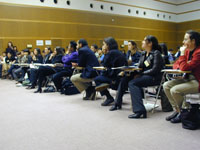 Yeah. It's very beautiful. I am studying about Ainu people in
Japan. I also study about indigenous people in Venezuela. And, well yes,
they have a lot of common problems, and I have found it very difficult to
do my research about Ainu people in Japan since many people, even
anthropologists, tell me that I can't compare the history of Ainu people
and the Indian people of South America. They have nothing in common to put
them together, in a work. I have also been studying the problem of Japan.
It's a multicultural country, since they told me "are you crazy? Japanese
society is so much in the society." [?] So I continue with that. It is very
difficult, you asked what kind of plans or actions or projects we could do.
We are trying. Many people around the Ainu, or Koreans, or Okinawans, many
people are in a lot of movements, but I'm studying and doing research in
the faculty of education, trying to do educational projects for indigenous
people in Japan. It sounds crazy, but it's very difficult to work. If I do
a project an answer I have found is "why is it good for Japan to study
about Ainu people in the Japanese formal system of education. How do I
follow my project up? How can I do it if I find that limit in the same
faculty of education in a Japanese University?
Yeah. It's very beautiful. I am studying about Ainu people in
Japan. I also study about indigenous people in Venezuela. And, well yes,
they have a lot of common problems, and I have found it very difficult to
do my research about Ainu people in Japan since many people, even
anthropologists, tell me that I can't compare the history of Ainu people
and the Indian people of South America. They have nothing in common to put
them together, in a work. I have also been studying the problem of Japan.
It's a multicultural country, since they told me "are you crazy? Japanese
society is so much in the society." [?] So I continue with that. It is very
difficult, you asked what kind of plans or actions or projects we could do.
We are trying. Many people around the Ainu, or Koreans, or Okinawans, many
people are in a lot of movements, but I'm studying and doing research in
the faculty of education, trying to do educational projects for indigenous
people in Japan. It sounds crazy, but it's very difficult to work. If I do
a project an answer I have found is "why is it good for Japan to study
about Ainu people in the Japanese formal system of education. How do I
follow my project up? How can I do it if I find that limit in the same
faculty of education in a Japanese University?
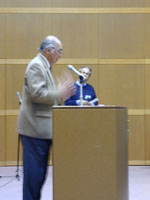 Yes. This is a very good question, and I must frankly tell you that I have
no good answer to your question. But I have a bad answer. In a sense, you
are quite right in saying that the Japanese feel that the Ainu people are
different from the indigenous peoples in Latin America. Maybe, just to
explain something which you may understand better. In Latin America you
have Argentina. Argentina is a Caucasian country because they have
eliminated many, there are still Mapuchiks[?] and others but they are very
small, because they have been eliminated. Japan is the same thing. Japan is
like Argentina. We have Ainu people - a very small number, and a small
number because they have been eliminated, killed violently sometimes, or
killed economically otherwise. So this is part of the Japanese myth, that
we are homogenous and so the Japanese Japanese believe that the Ainu
problem is there maybe but they have to be integrated. That's completely
wrong. I am saying this because also, I am one fourth French, but also I am
Japanese Japanese, not Ainu. But my point as a Japanese Japanese is that in
the 22nd or the 23rd century, the Japanese Japanese will a national
minority in the archipeligo called Japan. And so for us Japanese Japanese
we have to learn to co-exist among different ethnic groups and our myth has
been very useful until now, to develop a homogenised economically
prosperous Japan, but that will not last very long. Already now we are
discriminating against foreign workers. Not only foreign, but also Japanese
origin workers coming from Peru are also discriminated against. So we have
to overcome that and this is where the Ainu, we should be proud to have an
Ainu, even a small minority, because they are the source of new energies
for Japan to become a pluralistic country. We have to fight against
discrimination - both gender and racist, not because that's bad, but also
because we need the cooperation - the gender cooperation. We need women to
speak up more, because they have a wisdom which is not there in men. We
have to live together with the Ainu people because they have a much more
correct sensitivity about nature, about living with nature. Their religion
is much more meaningful than the Japanese Japanese approach. So we have to
learn from the Ainu people, and they have to be strengthened in that sense,
not only because they are discriminated against, and that's bad, but
because they have some good messages. And that's what I learned from that.
Yes. This is a very good question, and I must frankly tell you that I have
no good answer to your question. But I have a bad answer. In a sense, you
are quite right in saying that the Japanese feel that the Ainu people are
different from the indigenous peoples in Latin America. Maybe, just to
explain something which you may understand better. In Latin America you
have Argentina. Argentina is a Caucasian country because they have
eliminated many, there are still Mapuchiks[?] and others but they are very
small, because they have been eliminated. Japan is the same thing. Japan is
like Argentina. We have Ainu people - a very small number, and a small
number because they have been eliminated, killed violently sometimes, or
killed economically otherwise. So this is part of the Japanese myth, that
we are homogenous and so the Japanese Japanese believe that the Ainu
problem is there maybe but they have to be integrated. That's completely
wrong. I am saying this because also, I am one fourth French, but also I am
Japanese Japanese, not Ainu. But my point as a Japanese Japanese is that in
the 22nd or the 23rd century, the Japanese Japanese will a national
minority in the archipeligo called Japan. And so for us Japanese Japanese
we have to learn to co-exist among different ethnic groups and our myth has
been very useful until now, to develop a homogenised economically
prosperous Japan, but that will not last very long. Already now we are
discriminating against foreign workers. Not only foreign, but also Japanese
origin workers coming from Peru are also discriminated against. So we have
to overcome that and this is where the Ainu, we should be proud to have an
Ainu, even a small minority, because they are the source of new energies
for Japan to become a pluralistic country. We have to fight against
discrimination - both gender and racist, not because that's bad, but also
because we need the cooperation - the gender cooperation. We need women to
speak up more, because they have a wisdom which is not there in men. We
have to live together with the Ainu people because they have a much more
correct sensitivity about nature, about living with nature. Their religion
is much more meaningful than the Japanese Japanese approach. So we have to
learn from the Ainu people, and they have to be strengthened in that sense,
not only because they are discriminated against, and that's bad, but
because they have some good messages. And that's what I learned from that.
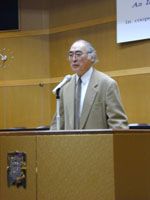 Yes. I see your point in mentioning that the Buraku discrimination is not
part of racism, because that's the position of the Japanese government,
with which I disagree completely, but I see that it's natural, when you say
that racism is based on race. But actually, race is something that does not
exist in reality. It's just an ideology, so there is this U.N. convention
against racial discrimination and all forms of discrimination, together.
And they are putting in a package all kinds of discrimination and calling
it racist discrimination. So I'm using this term in the U.N. way because
they put everything on racism. But in the case of Buraku discrimination, it
is a racist discrimination, not because the Buraku people are a different
race, but because it's based on Japanese racism. To be proud of being
Japanese you need an Emperor and you need a Buraku under you. So this is
part of Japanese racism. To be proud of being Japanese, you have to be
proud that you are not Buraku - you need the Buraku to discriminate against
so that you feel good to be Japanese. To be Japanese is to be middle class
and to be part of the unity of Japanese people and the Emperor. So that is
racism. So that's the point I'd like to make.
Yes. I see your point in mentioning that the Buraku discrimination is not
part of racism, because that's the position of the Japanese government,
with which I disagree completely, but I see that it's natural, when you say
that racism is based on race. But actually, race is something that does not
exist in reality. It's just an ideology, so there is this U.N. convention
against racial discrimination and all forms of discrimination, together.
And they are putting in a package all kinds of discrimination and calling
it racist discrimination. So I'm using this term in the U.N. way because
they put everything on racism. But in the case of Buraku discrimination, it
is a racist discrimination, not because the Buraku people are a different
race, but because it's based on Japanese racism. To be proud of being
Japanese you need an Emperor and you need a Buraku under you. So this is
part of Japanese racism. To be proud of being Japanese, you have to be
proud that you are not Buraku - you need the Buraku to discriminate against
so that you feel good to be Japanese. To be Japanese is to be middle class
and to be part of the unity of Japanese people and the Emperor. So that is
racism. So that's the point I'd like to make.
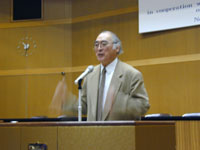 This is a very important question, not only in Japan, but all around the
world. I would like to also have a reply from Dr. Gandhi about it, I had a
talk with an Indian friend who told me that he just recently learned, after
he had grown up, that his family was a Brahmin family. And until then he
was not aware of the caste issue. His father and his parents were against
caste, so they didn't talk about caste. But then could not understand the
existence of the Dhalit [?] people, because he did not have a sense of the
reality of the caste system in India. So I think, to hide it, and not to
talk about it is not the correct answer. In Japan also the problem is,
you're right, when people who are unaware that they belong to the Buraku.
When they learn it, it's a shock. And there are many cases, two or three
each year, of girls especially who are committing suicide, because they did
not know that they were Buraku, but the family of the [future] husband made
an investigation and found out that they were Buraku. So they broke the
engagement of their son and the Buraku girl. So this is very important to
know about the existence of Buraku, and one tendency, which is still small,
but which I admire is that the youth, Buraku Youth, which wants to say "we
are fighting against all discrimination against Buraku." But they are proud
of being part of the Buraku. And I think that they are right historically,
because Japanese art came from the Buraku, and so the non-Buraku people
should appreciate their contribution because the Noh theatre, the Kabuki
theatre, Japanese gardens - all these things were built by the Buraku
people. So they have to be proud of their heritage, so it's very silly and
bad to discriminate against Buraku people. The Buraku people have a
historical root which is very important in Japan. So that's my answer -
it's something which should be allowed to come up, and probably in India,
Dr Endid Carr [?]contribution was interesting, very meaningful, and there
was some disagreement between Gandhi-ji and Carr[?] and the dialogue, the
tension, was very constructive. But now the problem is how to build this
into a whole, to have the Buraku people who have a kind of separatist idea
to come together with other discriminated people.
This is a very important question, not only in Japan, but all around the
world. I would like to also have a reply from Dr. Gandhi about it, I had a
talk with an Indian friend who told me that he just recently learned, after
he had grown up, that his family was a Brahmin family. And until then he
was not aware of the caste issue. His father and his parents were against
caste, so they didn't talk about caste. But then could not understand the
existence of the Dhalit [?] people, because he did not have a sense of the
reality of the caste system in India. So I think, to hide it, and not to
talk about it is not the correct answer. In Japan also the problem is,
you're right, when people who are unaware that they belong to the Buraku.
When they learn it, it's a shock. And there are many cases, two or three
each year, of girls especially who are committing suicide, because they did
not know that they were Buraku, but the family of the [future] husband made
an investigation and found out that they were Buraku. So they broke the
engagement of their son and the Buraku girl. So this is very important to
know about the existence of Buraku, and one tendency, which is still small,
but which I admire is that the youth, Buraku Youth, which wants to say "we
are fighting against all discrimination against Buraku." But they are proud
of being part of the Buraku. And I think that they are right historically,
because Japanese art came from the Buraku, and so the non-Buraku people
should appreciate their contribution because the Noh theatre, the Kabuki
theatre, Japanese gardens - all these things were built by the Buraku
people. So they have to be proud of their heritage, so it's very silly and
bad to discriminate against Buraku people. The Buraku people have a
historical root which is very important in Japan. So that's my answer -
it's something which should be allowed to come up, and probably in India,
Dr Endid Carr [?]contribution was interesting, very meaningful, and there
was some disagreement between Gandhi-ji and Carr[?] and the dialogue, the
tension, was very constructive. But now the problem is how to build this
into a whole, to have the Buraku people who have a kind of separatist idea
to come together with other discriminated people.
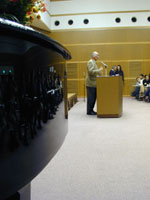 I'd just like to comment on the internet as the next medium. I was working
for One-World, which is an electronic NGO forum, based in The United
Kingdom. And they are very much aware that not everybody has access to a
computer especially in the south, so what they do is this: not everybody
has a computer, but almost everybody has a radio, so you can produce little
radio clips and they have a library of radio clips, so they collect these
radio clips from NGOs and the radio station can download it from the
internet or they can have a tape sent to them, and so they can broadcast
it on local radio. So while not everybody has access to a computer, or
until they get a computer, they can still listen to the radio. The other
thing is, the local electronic NGO forum is JCA NET, and they have a
campaign going where they collect old computers, so you can send your
computer to the representative of JCA NET in Tokyo, and they will send
these computers to Brazil, so that village children will have education in
the use of computers, and they can use your computer. So if you have one at
home, you might want to send it to Tokyo.
I'd just like to comment on the internet as the next medium. I was working
for One-World, which is an electronic NGO forum, based in The United
Kingdom. And they are very much aware that not everybody has access to a
computer especially in the south, so what they do is this: not everybody
has a computer, but almost everybody has a radio, so you can produce little
radio clips and they have a library of radio clips, so they collect these
radio clips from NGOs and the radio station can download it from the
internet or they can have a tape sent to them, and so they can broadcast
it on local radio. So while not everybody has access to a computer, or
until they get a computer, they can still listen to the radio. The other
thing is, the local electronic NGO forum is JCA NET, and they have a
campaign going where they collect old computers, so you can send your
computer to the representative of JCA NET in Tokyo, and they will send
these computers to Brazil, so that village children will have education in
the use of computers, and they can use your computer. So if you have one at
home, you might want to send it to Tokyo.
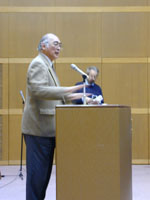 Yes. This is a very good question. And since you are asking it from a
Latin-American point of view, I have a Latin-American example to give you.
Because I have a great admiration for Comindante Marcos, and Comindante
Marcos, who is leading the movement based on indigenous peoples in the
Chapas region - the Zapatistas. He is making a very clever use of the
internet. And it is because he started by sending e-mails to Nobel Prize
winners, and the Nobel Prize winners, including natural scientists, who
never thought about indigenous peoples, found out what the Mexican
government was doing was terrible, that they've sent letters to the
President of Mexico, and then they continued to raise the world
consciousness about indigenous peoples through the internet. This is a
typical example of what we believe we should do. There is, on the one hand,
Mr Gore, and all the people who are promoting "an information highway" -
to use the internet for the multinationals and all the prosperity of the
world economy. And then you can use the internet, not the highway, but
rather the narrow lanes, and that's where we have to work. And also in
terms of the internet, not in terms of TV - I don't think we can convince
TV, CNN to change their approach. But we should have alternative TV
programs, or even radio programs, which counter the false propaganda which
is developed through the powerful TV programs. So I think it's wrong to say
the whole technology is bad, it is used in a bad way by bad people. Good
people should not just say that the whole thing is bad, we have to use it
in a clever way, as Comindante Marcos is doing.
Yes. This is a very good question. And since you are asking it from a
Latin-American point of view, I have a Latin-American example to give you.
Because I have a great admiration for Comindante Marcos, and Comindante
Marcos, who is leading the movement based on indigenous peoples in the
Chapas region - the Zapatistas. He is making a very clever use of the
internet. And it is because he started by sending e-mails to Nobel Prize
winners, and the Nobel Prize winners, including natural scientists, who
never thought about indigenous peoples, found out what the Mexican
government was doing was terrible, that they've sent letters to the
President of Mexico, and then they continued to raise the world
consciousness about indigenous peoples through the internet. This is a
typical example of what we believe we should do. There is, on the one hand,
Mr Gore, and all the people who are promoting "an information highway" -
to use the internet for the multinationals and all the prosperity of the
world economy. And then you can use the internet, not the highway, but
rather the narrow lanes, and that's where we have to work. And also in
terms of the internet, not in terms of TV - I don't think we can convince
TV, CNN to change their approach. But we should have alternative TV
programs, or even radio programs, which counter the false propaganda which
is developed through the powerful TV programs. So I think it's wrong to say
the whole technology is bad, it is used in a bad way by bad people. Good
people should not just say that the whole thing is bad, we have to use it
in a clever way, as Comindante Marcos is doing.
|
|
|
|
|
|
|
|
|
|
|
|